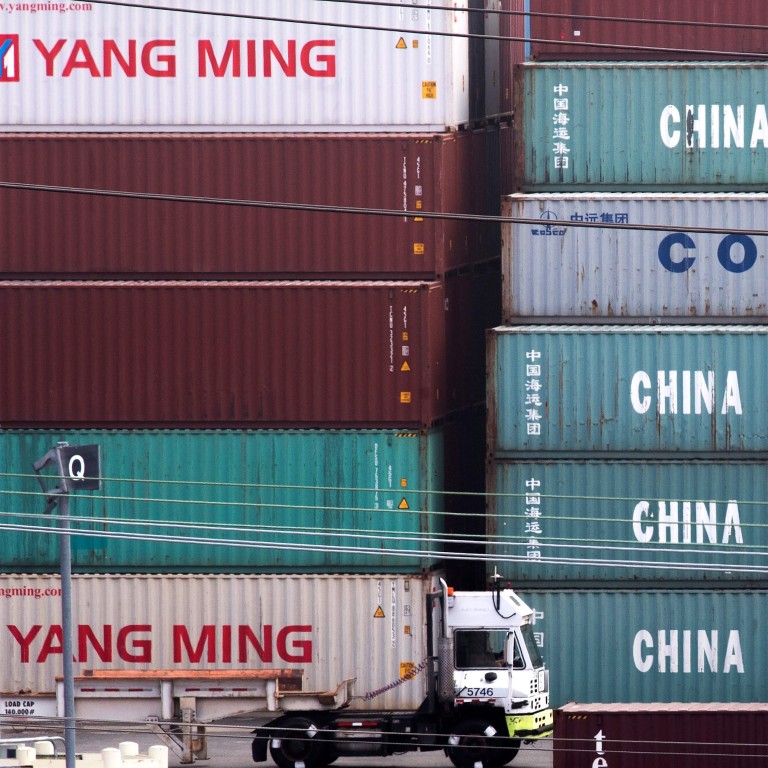
US-China trade war to weigh less on Asian economies in 2020, company earnings to drive markets, CLSA says
- US economy expected to contract in the second, third quarters of next year, according to CLSA’s Adrian Mowat
- Truce in the trade war likely to continue in 2020, making it less of a headwind in Asia, Mowat says
The US-China trade war will no longer be a “headwind” for Asian economies in 2020 and earnings growth next year is likely to drive equity markets in the region, according to Adrian Mowat, CLSA’s chief strategist.
The Hong Kong-based investment group expects the American economy to contract in the second and third quarter of next year, entering into a “technical recession”, but a United States slowdown will not have the same effect it has had on emerging markets in the past.
“What the trade war did was it brought forward the export hits and the export hits have been quite pronounced … it’s taught us that actually these [emerging market] economies are a lot more about the domestic growth environment than they are about the external sector,” Mowat said. “Our view on the trade war is that this trade truce continues. The tariffs have gone up. The impact has been felt and it’s been more pronounced than you would normally see with a US slowdown. That’s why I think [a US slowdown] becomes much less of a negative driver.”
The US and China have been embroiled in a trade war for nearly 18 months, with US President Donald Trump putting tariffs on hundreds of billions of dollars of Chinese-made goods as he tries to change decades of industrial and trade policy by Beijing.
The US economy is expected to grow at a 1 per cent rate in 2020, according to CLSA, a more bearish call than many research firms and banks. The US slowdown could prompt as many as four rate cuts by the US Federal Reserve next year, according to CLSA.
V word rears its head in 2020 as trade war roils global investments
The Fed held interest rates steady on Wednesday, but signalled it would be willing to cut interest rates if necessary.
“The [Federal Open Market] Committee will continue to monitor the implications of incoming information for the economic outlook, including global developments and muted inflation pressures, as it assesses the appropriate path of the target range for the federal funds rate,” the Fed said in a statement on Wednesday.
The Fed raised rates four times in 2018, with many economists expecting more rate increases at the beginning of this year as unemployment remained low and the Fed forecast rising inflation. However, the central bank reversed course and cut rates three times this year as concerns grew over slowing global growth and a potential US recession against the backdrop of rising tensions with China.
HSBC Global Asset Management said it expects slow, but steady growth next year as inflation remains low and central banks remain more accommodative in their monetary policy – even as uncertainty over the trade war lingers in the background.
“We live in an age of uncertainty. Clearly the trade relationship between the US and China is one of those sources of uncertainty,” Dominic Bryant, senior macro strategist at HSBC Global Asset Management, said. “These tensions can flare up again, but if you look at what happened in 2019, the dynamic now between the two countries is much more positive than it was six months or nine months ago. What last year taught us is that monetary policy perhaps remains a more potent tool than people thought it was, so if some of these risks materialise, what we feel is that you can get another policy response.”
Kevin Mathews, Aviva Investors’ global head of high yield, and Josh Lohmeier, Aviva Investors’ head of North American investment-grade credit, said the progress of US-China trade negotiations will give investors a view on how economic growth will fare globally next year.
“Markets will keep a close watch on each of the multiple stages of the Sino-American trade negotiations,” Mathews and Lohmeier said in their 2020 credit outlook. “The more comprehensive a deal the better, while a partial resolution – or no resolution at all – would have a negative impact on some global high-yield assets. Meanwhile, investment-grade yield spreads are already tight and could widen significantly if the economy turns; on the flip side, they could tighten further if the cycle runs on.”

